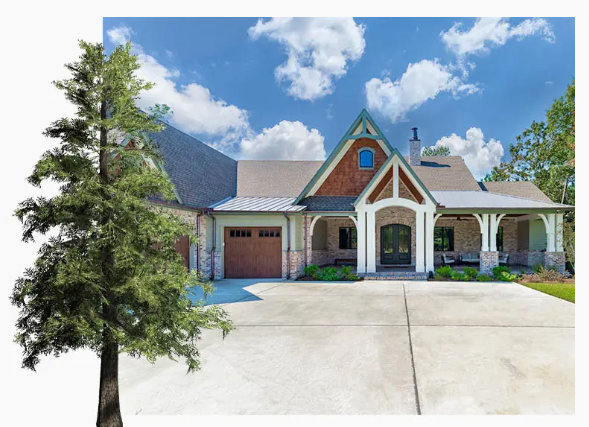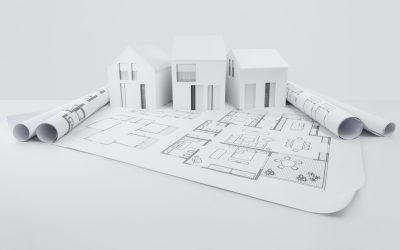Are you trying to figure out how to get a loan to build a house? Building a home is one of the most exciting and rewarding experiences you can embark upon. For those looking to create a luxury, custom-built residence in the greater Houston area, finding the right construction financing is a crucial first step.
At Picklo Homes, we understand that financing the construction of a custom home can feel overwhelming. That’s why we’ve created this guide to help you understand the process and get the loan you need to make your vision of home a reality.
Whether you’re looking to build on your lot or within a planned community, here’s everything you need to know about securing a loan to build a custom home.
1. Understand the Basics of Construction Loans & How to Get a Loan to Build a House
When it comes to building a home, a traditional mortgage won’t apply. Instead, you’ll need a construction loan, a short-term loan specifically designed to fund the building process. Here’s how it works:
- Short-term Financing: Construction loans are typically issued for 12 to 18 months, covering the duration of your build.
- Funds Disbursed in Stages: Unlike a traditional mortgage, where the loan amount is disbursed in full at once, construction loans release funds in phases, called “draws.” These align with major milestones in the building process, like laying the foundation, framing, and roofing.
- Interest-only Payments During Construction: You’ll make interest-only payments on the loan during construction. This amount varies based on the balance drawn from the loan at each stage.
Once construction is complete, you’ll usually have the option to convert the construction loan into a traditional mortgage, allowing for long-term, manageable monthly payments.
2. Types of Home Construction Loans: Construction-to-Permanent vs. Standalone Construction Loans
Understanding the different types of home construction loans will help you decide which is best for your project and financial situation.
- Construction-to-Permanent Loan: This loan simplifies the process by converting into a traditional mortgage once the home is built. You’ll have a single application, one closing, and a fixed rate for your mortgage. It’s an excellent choice if you want to avoid multiple loans and closing costs.
- Standalone Construction Loan: Also known as a “construction-only loan,” this option finances the construction only. Once construction is complete, you’ll need a separate mortgage to pay off the balance. Although it requires two applications and closings, a standalone loan might offer flexibility if you anticipate changes in market rates or personal finances over the construction period.
For those interested in building a custom home (stick-built home), the construction-to-permanent loan is often the preferred choice, as it minimizes closing costs and simplifies the financing process.
3. Construction Loan Pre-Qualification: Assessing Your Financial Situation
Before applying for a construction loan, it’s essential to get pre-qualified. This involves evaluating your financial situation and determining how much you can borrow. Pre-qualification will give you a clear understanding of your budget, which will guide decisions about your custom home design, materials, and amenities.
Key factors lenders consider during pre-qualification include:
- Credit Score: A strong credit score is essential. Generally, lenders look for a score of at least 680, but for a luxury build, a score of 720 or higher will improve your loan terms.
- Income and Employment History: Lenders want assurance that you have a stable income and employment history to manage loan payments.
- Debt-to-Income Ratio: Your debt-to-income ratio should ideally be below 45%. Lower ratios indicate a stronger financial position and lower lending risk.
- Down Payment: Construction loans usually require a higher down payment than conventional mortgages—typically around 20-30% of the project cost.
4. Selecting a Lender Experienced with Custom Home Construction Loans
Not all lenders offer construction loans, so it’s important to select a lender with specific experience in financing custom homes. Local banks and credit unions often have programs designed for construction loans and are familiar with the requirements for residential construction in Houston and surrounding areas.
When choosing a lender, ask questions about:
- Their familiarity with financing custom luxury homes
- Interest rates and loan terms specific to construction loans
- Flexibility with construction timelines and loan draws
Working with an experienced lender will ensure that the loan process runs smoothly and aligns with the construction timeline for your new home.
5. Preparing Your Construction Loan Application
Once you’ve chosen a lender, you’ll need to complete your loan application. Here’s what typically goes into this process:
- Detailed Project Plans: Lenders need a detailed construction plan that includes architectural drawings, a breakdown of materials, and a timeline. Working with a professional home builder like Picklo Homes ensures you’ll have an accurate and comprehensive project plan, which is essential for loan approval.
- Builder Contract: The lender will require a contract between you and your builder that specifies the project cost, payment schedule, and timeline. The contract should include contingency plans in case of unexpected delays or budget changes.
- Appraisal: To determine the home’s future value, lenders often conduct an appraisal based on the project plans. This helps them assess risk and ensures the loan aligns with the anticipated value of the completed home.
- Proof of Land Ownership: If you’re building on your lot, you’ll need to provide proof of ownership. For those building in a planned community, this step is typically managed by the builder and developer.
6. Managing Your New Build Loan During Construction
Once approved, the construction loan will cover the project’s costs in phases. During this time, you’ll coordinate with your builder and lender to ensure funds are drawn according to schedule.
Here are a few tips for managing your loan during construction:
- Stay in Close Communication with Your Builder: Regular updates help you track progress and anticipate any potential budget adjustments.
- Adhere to the Draw Schedule: Sticking to the pre-arranged schedule ensures funds are available when needed, minimizing delays.
- Monitor Your Budget: It’s essential to account for any unanticipated expenses to avoid exceeding your loan amount.
Questions about managing your home construction loan with an existing mortgage?
7. Converting Your New Build Loan and Moving In
When construction is complete, it’s time to convert your construction loan into a traditional mortgage, provided you opted for a construction-to-permanent loan. Your lender will conduct a final inspection, ensuring all aspects of the build are complete and compliant.
Once this final stage is complete, you’ll transition to a standard mortgage with predictable monthly payments. At this point, all the hard work—from financing to planning and construction—culminates in moving into your beautiful new home.

Partnering with an Experienced Custom Home Builder
As experienced Houston Home Builders, we specialize in building luxury custom homes across the area, whether on your own lot or within one of the vibrant planned communities we partner with.
Our experience ensures you’ll have a seamless, enjoyable experience from start to finish. By guiding you through every phase of your new home construction project, from the initial concept to financing, we make building your vision of home a reality.
If you’re ready to start your journey toward home, contact Picklo Homes today at 281-252-4447. We’re here to guide you through every step and create a home you’ll love for a lifetime.



